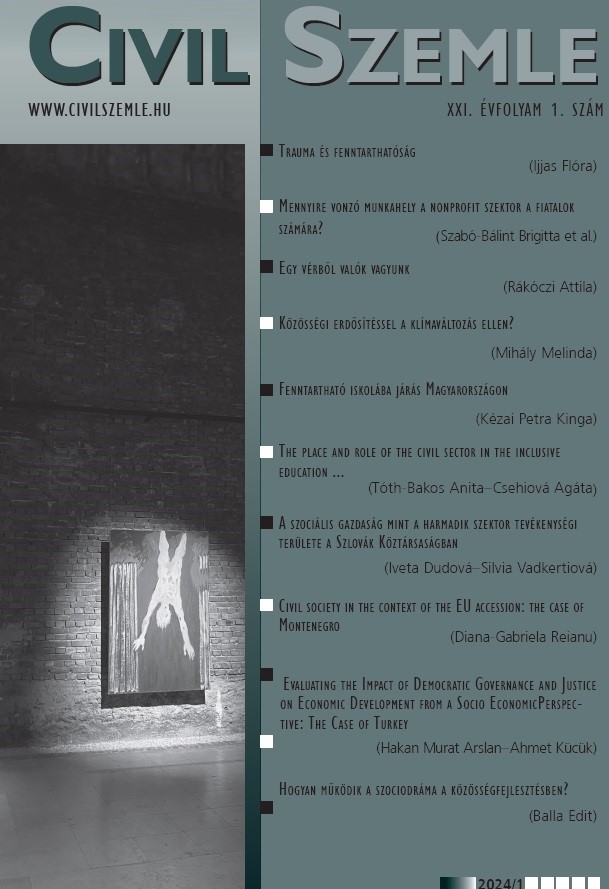How attractive is the nonprofit sector as a workplace for young people?
Abstract
The aim of our study is to present higher education students’ career plans and ideas about employment, highlighting the characteristics of the non-profit sector. Our research questions are: How attractive is the non-profit sector as a workplace for young people, and whether are there differences in career plans and employee perceptions between those who prefer the non-profit, competitive, and public sectors? In the course of the research, all students of the University of Pécs with active student status were surveyed at all levels of education. In total, 886 respondents out of a total population of 20,331 responded. In the case of career plans, only the career plans of full-time students with Hungarian citizenship were analysed. As a result, the population and sample size changed, with a total of 631 responses from a population of 11,887, resulting in a sample size of 5.3%. Our analysis found that only 10% of the students surveyed would like to work in the non-profit sector, while almost a third of those who have gained experi[1]ence in the non-profit sector would like to continue working there. Independence and a willingness to serve as a career orientation are much more strongly felt in the non-profit sector. Leadership competencies are least identified in the non-profit sector. Our findings suggest that NPOs should target students already during their higher education studies to increase their future intention to work in this sector through positive experiences.
References
Arthur, Michael B. (1994): The boundaryless career: a new perspective for organizational inquiry, Journal of Organizational Behavior, 15., (4.), pp. 295–306.
Bácsné Bába Éva (2006): Módszertani eljárások az időtényező vezetési, szervezeti folyamatokban betöltött szerepének vizsgálatához. Agrártudományi közlemények, 2006/20, Különszám, pp. 24−32.
Bitter Janka–Molnár Krisztina–Siba Balázs–Visontai Kovách Dalma (2012): ÉLEN-JÁRÓK Kvalitatív kutatás a vezetői identitásról: forrásoktól a cselekvőképességig. Civil Szemle, 2012. 9(2), pp. 25-42.
Csehné Papp Imola (2016): Elvárások és realitások a munka világában. Taylor: gazdálkodás- és szervezéstudományi folyóirat, (8) 2. pp. 5-10.
DeFillippi, Robert J.–Arthur, Michael B. (1996): Boundaryless contexts and careers: A competency-based perspective, In: Arthur, Michael B. – Rousseau, Denise M. (Eds.): The boundaryless career, New York: Oxford University Press, pp. 116–131.
De Vos, Ans–Soens, Nele (2008): Protean attitude and career success: The mediating role of self-management. Journal of Vocational Behavior, Vol. 73., (3.), pp. 449-456.
Fényes Hajnalka–Mohácsi Márta–Pusztai Gabriella (2021): Belépéskori és tanulmányok alatti karriertudatosság a felsőoktatásban. Civil Szemle, 69., (4.), pp. 93-111.
Gergely Éva–Hágen István Zsombor–Pierog Anita (2016): Munkaérték és karrierhorgony – egyetemisták körében végzett felmérés eredményei. ACTA CAROLUS ROBERTUS 2062-8269 6., (2.), pp. 162-178.
Holland, John L. (1973): Making vocational choices: a theory of careers, New Jersey: Englewood Cliffs, Prentice-Hall.
Koncz Katalin (2013): Karriermenedzsment. Budapest: Budapesti Corvinus Egyetem.
Koncz Katalin (2004): Karriermenedzsment. Budapest: Aula Kiadó.
Kovács Kocsis Zsófia–Kovács Klára–Nataliia Varha –Nataliia Nikon–Bohdanna Hvozdetsk (2021): Felsőoktatási hallgatók munkavállalása és migrációs tervei egy nemzetközi összehasonlítás tükrében. Civil Szemle, 2021. ksz. pp. 185–203.
Lazarova, Mila–Cerdin, Jean-Luc–Liao, Yuan (2014): The Internationalism Career Anchor. International Studies of Management & Organization, 44., (2.), pp. 9-33. http://dx.doi.org/10.2753/IMO0020-8825440201
Markos Valéria (2018): Az önkéntes és fizetett munkát végző hallgatók családi hátterének és munkaérték preferenciáinak vizsgálata. PedActa, 8. (2.) pp. 1–16
Nárai Márta (2008): A nonprofit szervezetek helye és szerepe a helyi társadalmak életében – A nyugat-dunántúli nonprofit szektor helyzetfeltárása. Doktori disszertáció. ELTE Társadalomtudományi Kar, Szociológiai Doktori Iskola, Győr–Budapest
Sajtos László – Mitev Ariel (2007): SPSS kutatási és adatelemzési kézikönyv. Budapest: Alinea Kiadó.
Schein, Edgar H. (1996): Career Anchors Revisited: Implications for Career Development in the 21st Century. The Academy of Management Executive (1993-2005), 10., (4.), Careers in the 21st Century (Nov., 1996), pp. 80-88.
Schein, Edgar H. (1978): Career dynamics: Matching individual and organizational needs. MA: Addison-Wesley, Boston
Super, Donald E. (1973): The career development inventory. British Journal of Guidance and Counselling.
Suutari, Vesa–Taka, Milla (2004): Career Anchors of Managers with Global Careers. Journal of Management Development, 23(9), pp. 833–847.



